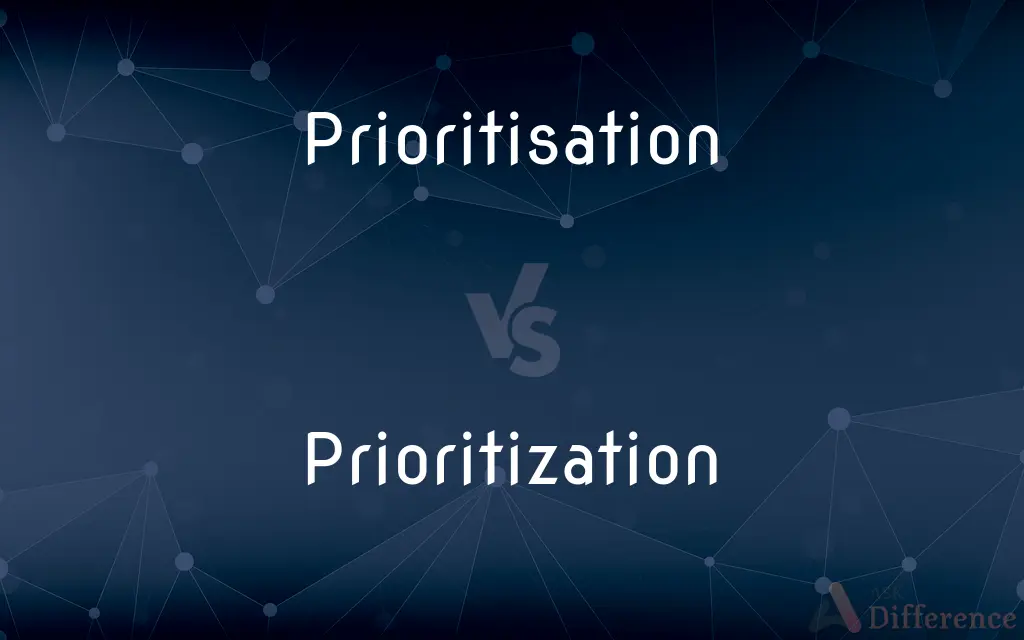Prioritisation vs. Prioritization — What's the Difference?
By Tayyaba Rehman — Updated on October 30, 2023
Prioritisation and Prioritization both refer to the action of arranging things in order of importance, but the former is British English spelling and the latter is American English spelling.

Difference Between Prioritisation and Prioritization
Table of Contents
ADVERTISEMENT
Key Differences
Prioritisation and Prioritization essentially denote the same process, the distinguishing feature being their usage in British and American English, respectively.
Prioritisation is predominantly seen in British-influenced regions, embodying the British style of adding the "s" in such "-isation" words, while Prioritization reflects the American preference for the "z" in "-ization" words.
One could encounter the term Prioritisation in documents, articles, or literature originating from the UK or other Commonwealth nations. In contrast, Prioritization would more frequently appear in materials from the US.
It's essential to note that neither version is incorrect. The choice between Prioritisation and Prioritization should align with the audience's familiarity or the established conventions of a particular region.
Both versions converge in meaning, emphasizing the act of determining the order of importance or urgency among a set of items or tasks.
ADVERTISEMENT
Comparison Chart
Regional Preference
British English
American English
Common Usage
UK and Commonwealth countries
United States
Spelling Variation
Uses "s" in "-isation"
Uses "z" in "-ization"
Meaning
Arranging in order of importance or urgency
Arranging in order of importance or urgency
Example Context
British academic papers, UK-based companies
American academic papers, US-based companies
Compare with Definitions
Prioritisation
The act of deciding the importance of tasks.
The team focused on the prioritisation of their goals.
Prioritization
The process of ranking tasks by importance.
Proper prioritization leads to increased productivity.
Prioritisation
Organizing based on significance.
Prioritisation helps streamline processes.
Prioritization
Arranging items based on their significance.
The success of the project depended on prioritization.
Prioritisation
Determining urgency among a set of items.
Prioritisation is crucial for effective project management.
Prioritization
Deciding what needs attention first.
Time management requires effective prioritization.
Prioritisation
Establishing a hierarchy based on value.
Prioritisation ensures critical tasks are addressed first.
Prioritization
Designating levels of urgency among tasks.
Prioritization is a key skill for leaders.
Prioritisation
Designating precedence among competing elements.
The manager emphasized the need for better prioritisation.
Prioritization
Setting a sequence for addressing concerns.
The committee discussed the prioritization of agenda items.
Prioritisation
(British spelling) nocap=1
Prioritization
Prioritization is the activity that arranges items or activities in order of importance relative to each other.In the context of medical evaluation it is the establishment of the importance or the urgency of actions that are necessary to preserve the welfare of client or patient. In the clinical context, establishing priorities aids in the rationale and justification for the use of limited resources.
Prioritization
To arrange or deal with in order of importance.
Prioritization
To treat or consider as of greater importance than other matters
Economic policies that prioritize job creation.
Prioritization
To put things in order of importance.
Prioritization
The process of assigning priorities to things or tasks.
Common Curiosities
Are "Prioritisation" and "Prioritization" synonymous?
Yes, they mean the same but differ in regional spelling.
Which regions prefer "Prioritisation"?
It's preferred in British English, commonly in the UK and Commonwealth.
Are there any differences in pronunciation?
Only slight, stemming from the "s" in "Prioritisation" and the "z" in "Prioritization".
Where is "Prioritization" primarily used?
In American English, especially in the US.
Should I use "s" or "z" in international documents?
Consider your audience, but often, American English ("z") is used for broader audiences.
How did the two spellings originate?
They stem from British and American variations in English spelling conventions.
Is one spelling more correct than the other?
No, both are correct; usage depends on the regional convention.
Do they have different meanings?
No, both refer to ranking items by importance or urgency.
Is "Prioritisation" only restricted to British contexts?
It's most common in British English but can be seen elsewhere.
In global companies, which form is more prevalent?
Many global companies adopt American English, so "Prioritization" might be more common.
Is there a difference in their usage in sentences?
No, they can be used interchangeably based on the regional spelling preference.
How does "Prioritization" fit into American grammar?
It aligns with the American style of using "z" in "-ization" words.
Can I interchangeably use both in a single document?
It's best to maintain consistency, so choose one based on your audience.
Which form is prevalent in academic journals?
Both can appear, but it depends on the journal's origin or preference.
Which form is seen more on the internet?
Both are present, but "Prioritization" may be more widespread due to the influence of American digital platforms.
Share Your Discovery

Previous Comparison
Mass vs. Massive
Next Comparison
Fatal vs. FatefulAuthor Spotlight
Written by
Tayyaba RehmanTayyaba Rehman is a distinguished writer, currently serving as a primary contributor to askdifference.com. As a researcher in semantics and etymology, Tayyaba's passion for the complexity of languages and their distinctions has found a perfect home on the platform. Tayyaba delves into the intricacies of language, distinguishing between commonly confused words and phrases, thereby providing clarity for readers worldwide.
















































